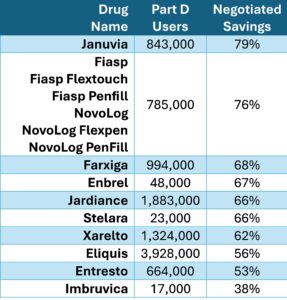By Daisy Brown, Legislative Liaison, TSCL
This August, Medicare announced that it has successfully negotiated new, lower prices for 10 key drugs for seniors. The negotiations reduced the drugs’ average costs by 63 percent. The new prices will take effect in 2026, and the Center for Medicare and Medicaid Services (CMS) expects seniors to save about $1.5 billion per year in out-of-pocket costs as a result.
Medicare completed these first-ever negotiations using powers granted by 2022’s Inflation Reduction Act, and pharmaceutical companies participated voluntarily. The negotiations prioritized life-saving medicines that treat conditions like:
- cardiovascular disease
- diabetes
- autoimmune disease
- and cancer.
If you look at the table below, you’ll also notice that Medicare prioritized drugs that many Medicare Part D beneficiaries rely on. Nearly four million Medicare Part D beneficiaries use Eliquis, which prevents and treats blood clots. Nearly two million use Jardiance, which treats diabetes, heart failure, and chronic kidney disease.
Drugs Negotiated by Medicare: Users and Cost Savings
And that’s only the beginning of the good news. Medicare is set to negotiate lower prices for 10 new drugs each year moving forward, with the next batch to be announced in Summer 2025.
The negotiation process will also prevent drug companies from price gouging seniors like you in the future. Once Medicare and a manufacturer agree on a price for a drug, its cost will remain tied to inflation and increase at the same rate as the Consumer Price Index for Urban Wage Earners—the same index used to calculate Social Security’s COLA.
At TSCL, we’re advocating for additional legislation that further expands Medicare’s power to negotiate drug prices with pharmaceutical companies. This will help improve the government’s budget, potentially letting it allocate more resources to other programs that support seniors. At the same time, we will push for incentives that maintain a competitive environment that encourages pharmaceutical companies to continue innovating new life-saving drugs and treatments.


